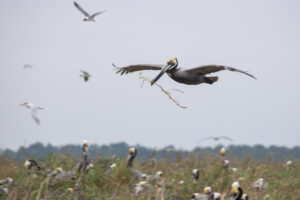For years, we’ve advocated for coastal management that balances nesting habitat with outdoor recreation. Colonial nesting seabirds–such as brown pelicans, black skimmers, and various species of terns–require specific habitats and features to raise their young. In South Carolina, Deveaux Bank is one of only six places that can support substantial colonies due to its nearness to food-filled sources, like vast salt marshes, and its isolated nature, which helps safeguard nests. These places face many of the same resiliency challenges as a lot of our coast, constantly eroding and accrediting at the whim of waves and tides. This is why we advocated earlier this year for “if you love Deveaux, don’t go!”, asking people to stay off of Deveaux and leave it for the birds.
This spring, the SC Department of Natural Resources officially closed off Deveaux Bank from public access during nesting season, bringing this vital habitat in line with the protections afforded to our other seabird sanctuaries, like Bird Key-Stono and Crab Bank. So far, the closure has been successful! Earlier this summer, biologists saw thousands of brown pelicans nestled in the dense vegetation with downy chicks, clusters of royal and sandwich tern colonies nesting eggs, Black skimmers incubating, and gull-billed terns with newly hatched eggs. We won’t know official nesting totals until later this year, but initial observations point towards a promising season.

